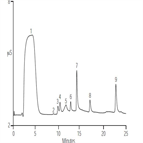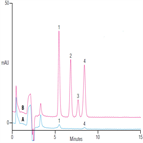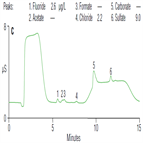Find methods for your needs
Refine by Feature
Displaying 1-4 of 4 results for Tag: pressurized water reactor
AU175: Determination of Organic Acids and Inorganic Anions in Lithium-Containing Boric Acid-Treated Nuclear Power Plant Waters
Instrument Type: ICIn nuclear power plants with pressurized water reactors the primary coolant includes boric acid, which at high temperature and pressure can form crud. Lithium hydroxide is added to prevent this. Trace anionic impurities can serve as catalysts for corrosion. The experimental approach shown in this work combines the direct injection, electrolytically generated tetraborate eluent approach to analyze lithium-containing borated waters for fluoride, formate, chloride, and sulfate with the addition of a continuously regenerated cation trap column to remove lithium and other cations from the sample.
AN166: Application of Eluent Generation for Trace AnionAnalysis of Borated Waters
Instrument Type: ICBoron as boric acid is used to control the nuclear reaction in pressurized water reactors because of its strong neutron-absorbing characteristics. To prevent corrosion, anionic contamination is monitored. Here sub-ppb concentrations of inorganic anions are determined in borated waters (<7500 mg/L boron) by large volume, direct injection using a tetraborate gradient on IonPac AS14 column. The tetraborate eluent is automatically generated inline by titrating 50 mM boric acid with electrolytically generated KOH. This is an improvement over using manually prepared solutions (AU102, AU191).
AN277: Fast and Sensitive Determination of Transition Metals in Power Industry Waters Using Ion Chromatography
Instrument Type: ICThis study describes the separation of iron (III), copper (II), nickel (II), and zinc (II) complexes with PDCA followed by postcolumn PAR reaction and absorbance detection at 530 nm. Surrogate samples include spiked deionized (DI) water (Boiling Water Reactor (BWR) surrogate) and spiked borated water containing lithium hydroxide with or without added zinc (Pressurized Water Reactor (PWR) surrogates).
AU191: Determination of Trace Fluoride, Chloride, and Sulfate in Lithium-Containing Borated Waters
Instrument Type: ICAt nuclear power plants, monitoring the concentrations of trace anions is important to reduce the risks associated with operation and to maintain plant reliability. IC is the most popular technique for the determination of anions in power plant waters because it provides the required sensitivity to detect trace-level concentrations. This application describes a simple and robust IC method for the determination of trace fluoride, chloride, and sulfate in lithium-containing borated waters.



